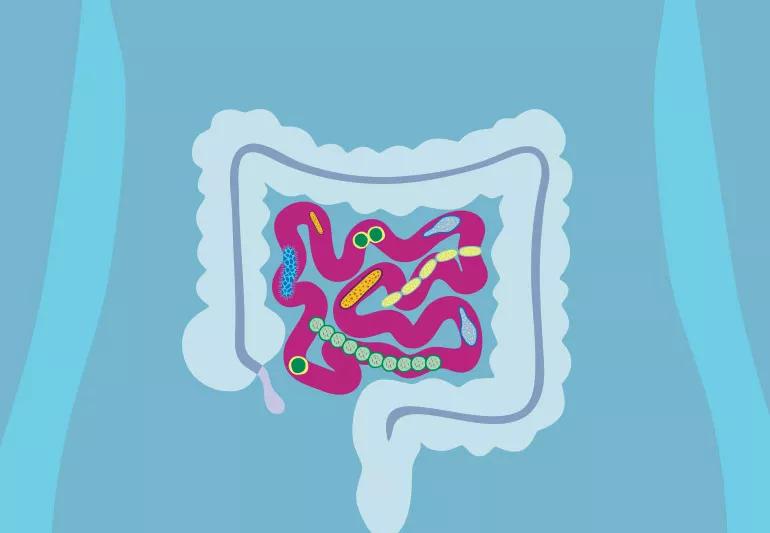Treatment involves rebalancing gut flora and looking for an underlying cause

Having a good balance of bacteria in your gut is important for your health. But having too much bacteria – and in the wrong place – can create problems.
Advertisement
Cleveland Clinic is a non-profit academic medical center. Advertising on our site helps support our mission. We do not endorse non-Cleveland Clinic products or services. Policy
That’s what happens in people who have SIBO, or small intestinal bacterial overgrowth.
Most gut microbes live in the large intestine, where they help the body absorb nutrients and protect the intestinal lining from harmful substances, among other things.
But when bacteria grow in abundance in the small intestine, they ferment carbohydrates from food and emit hydrogen or methane gas, which can lead to less-than-desirable digestive symptoms. It can also lead to nutrient malabsorption.
The precise definition of SIBO – and how (or if) it relates to conditions like irritable bowel syndrome and diabetes — has been controversial in the medical community, and isn’t well understood. But the way that gastroenterologist Michael Cline, DO, thinks about it is that it’s a byproduct of something else that is going awry in the body.
“When I talk about SIBO, I don’t talk about it as a disease – I talk about it as a symptom of another problem,” he explains. “Instead of treating it like a disease, I try to find out why someone has it.”
In other words, if someone has persistent SIBO, there’s probably something that’s making the small intestine a place where bacteria are prone to collecting.
For example, there might be a motility disorder at play that’s preventing food from moving through the digestive tract properly, causing bacteria to become stagnant and overgrow. SIBO also occurs in people who have had intestinal surgery that affects how their bowels function, for that same reason.
Advertisement
People with diabetes also get SIBO, Dr. Cline says. High blood sugar plus warm intestines equals bacterial growth.
SIBO can cause a rundown of generic GI complaints, like bloating, gas, diarrhea or constipation, or a feeling of fullness. Because these same symptoms often occur with other digestive conditions, they alone aren’t enough to know that SIBO is present.
It’s usually confirmed with a breath test that measures gas produced in the intestines over time. The test involves drinking a sugary concoction and breathing into a breathalyzer device several times.
But the test has limitations, Dr. Cline says. There’s isn’t a universally accepted range of “normal” or “abnormal” results, which leaves a lot up to interpretation. “This leads to false positives and negatives,” he says.
Then there’s the challenge of actually rebalancing the gut flora.
“First-line treatment is an antibiotic called rifaximin, which works beautifully, but it’s expensive and most insurers don’t want to pay for it,” Dr. Cline explains. “And, once you get off the antibiotics, the bacteria come back.”
So rather than diagnose SIBO, prescribe an antibiotic and send a patient on her way, Dr. Cline sees this as just the first step in getting to the bottom of a patient’s symptoms. The next step is identifying what caused the bacterial overgrowth to occur in the first place.
“If a patient is very symptomatic, we’ll try an antibiotic and then embark on a motility or anatomy evaluation,” he says.
A workup could include bloodwork, imaging, endoscopy and other diagnostic tests.
While there’s a lot left to learn about SIBO, the understanding of the role of the microbiome in our health has come a long way. If you suspect SIBO might be contributing to your digestive symptoms, a gastroenterologist has the tools to investigate the underlying cause and help you find relief.
Advertisement
Learn more about our editorial process.
Advertisement

Most recommended precautions center around minimizing bruising or swelling

Even one drink can have an impact on your cognitive function leading to slurred speech, blurred vision and impaired memory

Understand who may (and may not) benefit

Lorem ipsum dolor sit amet. Et odio Quis vel ipsam omnis eum alias deleniti et placeat impedit non voluptas galisum hic autem enim et cupiditate aliquid. Est beatae quidem non facilis autem ut commodi nisi aut tempore rerum et dolores voluptatem cum enim optio id sapiente quasi. Ad laboriosam officiis 33 cupiditate sequi ea voluptatum consectetur qui necessitatibus voluptate et quasi doloremque et facere explicabo quo explicabo officia

Seeking help through therapy can be an important step in improving your quality of life when you have UC

Type 2 diabetes isn’t inevitable with these dietary changes

Applying a hot or cold compress can help with pain